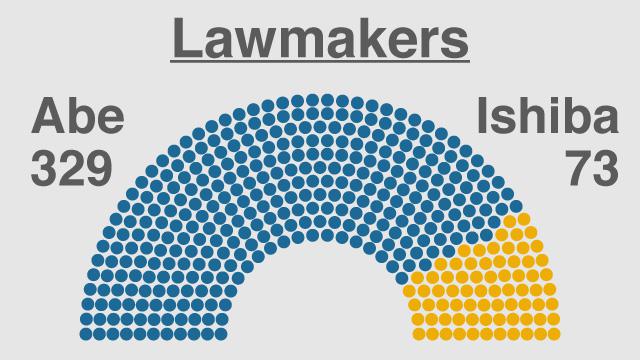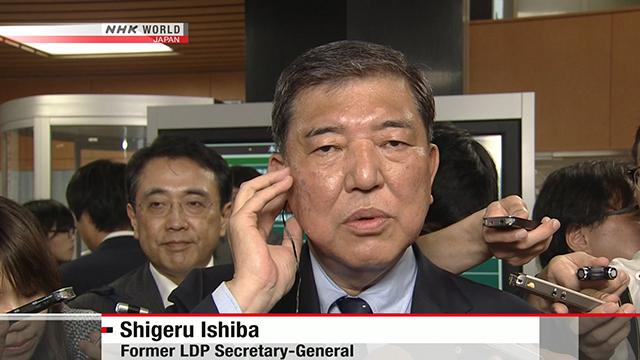LDP lawmakers cast their ballots on Thursday. 810 votes were up for grabs, with half allocated to LDP members of the Diet and the other half to rank-and-file LDP party members across Japan.

Prime Minister Shinzo Abe took 553 votes, while veteran lawmaker and former Defense Minister Shigeru Ishiba took 254.

Abe gained backing of more than 80 percent of LDP lawmakers, or 329 of them. Ishiba won support from 73 diet members.

As for non-lawmaker party members, Abe took 55 percent, or 224 votes. Ishiba won 45 percent, or 181. Abe didn't get as much support from them as he did from the Diet members -- a possible sign that non-lawmaker members view Abe's management of the government more strictly.
Following the election, Abe announced to his colleagues, "While addressing all the issues of the post-war era, I will solidify peace and stability in this country... I also want to take on the challenge of creating a new Japan. With your support, I will do my best to pass on to future generations a country filled with hope and pride.”

Ishiba announced, "This election has shown that the LDP has a diversity of opinions. I was able to gain support from many lawmakers and party members. It's my responsibility to make sure that their opinions will be reflected in government policy.”

Reasons for Abe's victory
The big focus of the election was Abe's achievements during his past 6 years in power.
During the leadership race, the prime minister stressed his achievements like an improved employment rate and stronger diplomatic ties. Abe's supporters are apparently betting on his vision for the country. That includes his economic policy dubbed Abenomics that he has credited for bringing Japan out of deflation and for creating more jobs. Some may also think Abe's diplomatic and security policies should be continued, looking the current global situation.
Also, Abe is apparently viewed as a winner and his record shows it. He's had 5 consecutive victories in national elections, and his supporters think he should be at the helm when the LDP members prepare for nationwide local elections and the Upper House election scheduled for next year.

Expectations for Abe's 3rd term
Following the election, Abe once again stressed, "I'm resolved to work hard towards amending the Constitution."
The Constitution has not been changed since its adoption 7 decades ago. Abe has said he wants it to stipulate the existence of the Self-Defense Forces. But there are differing opinions on which parts should be changed, not only among the members of the LDP but also the Komeito, its coalition partner. Some veteran lawmakers of the ruling parties have also said that they should get the understanding and support of opposition lawmakers.

Abe is also expected to continue with social welfare policies to combat the approaching demographic time bomb. He says that the consumption tax should be raised to 10 percent as scheduled in October next year, but he hopes to take measures to alleviate its negative impact as much as possible. Abe has postponed the tax hike twice, in 2015 and 2017.
Abe has also been dealing with political scandals that have dogged him for more than a year. One involves allegations that officials gave Abe's friend preferential treatment to open a veterinary school. Another is the Finance Ministry's falsification and discarding of documents related to a controversial land deal with private-school operator Moritomo Gakuen. Throughout the leadership race, Ishiba stressed that public trust in politics needs to be restored quickly. Several opposition parties have pointed out that the truth behind these scandals have not yet been uncovered.
Abe's goal may still be far away
Abe will reshuffle the party leadership and appoint a new Cabinet after the UN General Assembly next week.
He has expressed his desire to amend the constitution again and again, but a national referendum will be required to accomplish that. NHK's April poll suggests the public is divided on constitutional amendment, with 68 percent saying other issues should be handled first.

Besides next year's consumption tax hike, many major events are coming up, including the Emperor's abdication, the Crown Prince's ascension, and the 2020 Tokyo Olympics and Paralympics. Abe's goal of constitutional amendment may still be a long way off.

